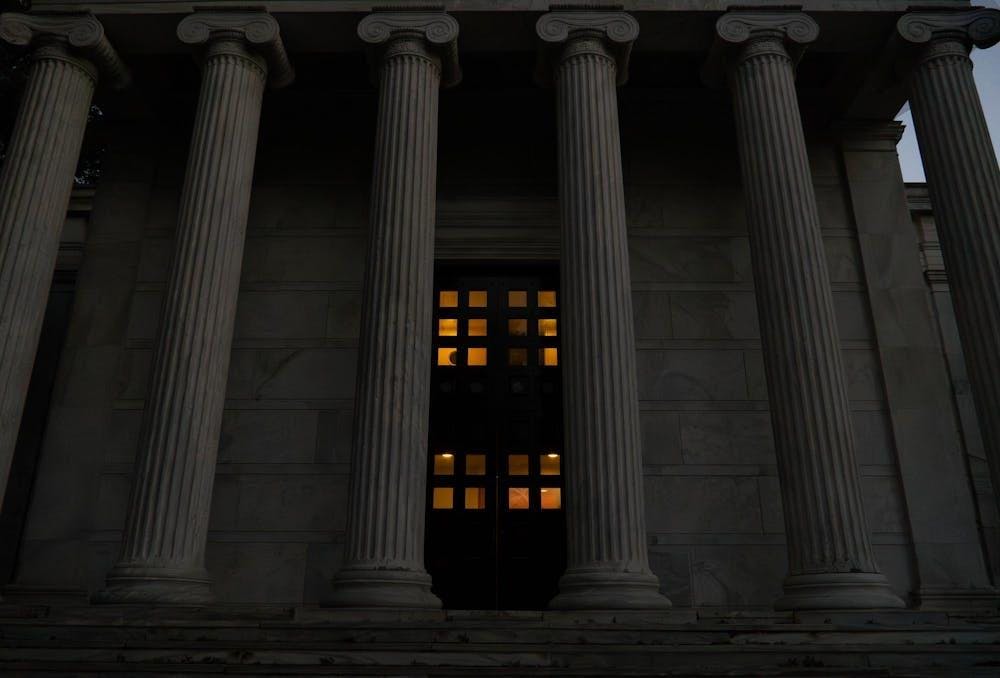A lawyer for David Piegaro ’25, who is suing the University over an April 2024 altercation at Clio Hall, submitted a letter on Wednesday broadly disputing the University’s request last week for permission to file a motion to dismiss the suit. One day later, the judge presiding over the case permitted the University to file its motion.
Piegaro was arrested during the Princeton “Gaza Solidarity Encampment” in April 2024 following a brief altercation with Assistant Vice President of Public Safety Kenneth Strother at the top of the stairs of Whig Hall, where Piegaro fell down the stairs after trying to enter the building.
He was then arrested for assault and trespassing and placed on disciplinary probation, although Piegaro maintains that Whig Hall was open to the public and Strother had been the one to initiate contact between the two.
Piegaro’s trespassing charge was dropped in February, and he was acquitted of the assault charge in April. In August, Piegaro sued Strother and the University over the saga, demanding unspecified damages.
Two months and two extensions later, Lawrence S. Lustberg, the University’s lawyer, finally responded last week, asking for permission to file a motion to partially dismiss the complaint. Lustberg argued that Piegaro’s constitutional, superior, and tort accusations all failed due to either a failure to meet relevant evidentiary standards or as a matter of law.
In his Wednesday letter, Piegaro’s attorney argued otherwise. Piegaro’s initial suit included claims for emotional damages, violation of his constitutional rights, and unlawful arrest.
In its letter for requested dismissal last week, the University said that Piegaro’s charges of retaliation, unlawful arrest, and malicious prosecution failed because Strother had probable cause to arrest him, as determined by the municipal court in Piegaro’s February trial.
Schwartz claimed that probable cause would not be enough to dismiss Piegaro’s claims, and argued that regardless, the University had misapplied relevant case law (Montgomery v. DeSimone, U.S. Court of Appeals, 1998).

Schwartz also called into question the University’s attempt to show Piegaro’s claim that Strother fabricated evidence — by allegedly lying on his arrest report that he told Piegaro Whig Hall was closed and that Piegaro initiated contact, among other claims — as irrelevant.
Citing the case Black v. Montgomery, Schwartz asserted that “an ‘acquitted criminal defendant’ pleads a fabrication of evidence claim ‘if there is a reasonable likelihood that, absent that fabricated evidence,’ he ‘would not have been criminally charged.’”
Piegaro’s experience with Strother is corroborated by “video recordings, photographs, and a third-party witness,” according to Piegaro’s response.
“If Strother had told the truth, Piegaro could not have been charged. If Strother had admitted, for example, that Whig Hall was open to students and that he did not tell Piegaro otherwise, Piegaro could not have been charged with trespass,” the response says.

Schwartz also countered the University’s claims that a claim of liability and intentional infliction of emotional damages fail. The University argued that Piegaro needed to demonstrate “policy or custom” leading to violations of constitutional rights, as opposed to the conduct of a single officer.
Schwartz argued that the liability claim could still stand based on the “likelihood that the situation will recur and the predictability that an officer lacking specific tools to handle that situation will violate citizens’ rights.”
Regarding Piegaro’s emotional damages claim, Schwartz, citing precedent, asserted that Strother’s initiated conduct was “‘beyond all possible bounds of decency’ and ‘utterly intolerable in a civilized society.’”
Schwartz added that Princeton can not seek immunity from negligent infliction of emotional damages, claiming it is not applicable in a case where Princeton has been accused of “‘damage by a willful, wanton or grossly negligent act.’”
The University has now been permitted to file a motion to dismiss parts of Piegaro’s complaint. A due date for the motion has not yet been set.
Luke Grippo is an assistant News editor for the ‘Prince.’ He is from South Jersey, and typically covers University and town politics, on a national, regional, and local scale. He can be reached at lg5452[at]princeton.edu.
Please send any corrections to corrections[at]dailyprincetonian.com.








